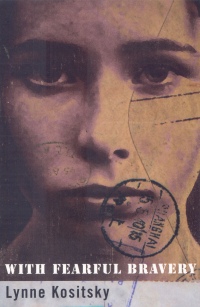| ________________
CM . . .
. Volume xxi Number 25 . . . . March 6, 2015
excerpt:
In With Fearful Bravery, Kositsky returns to World War II and the Holocaust, themes she wrote about in The Thought of High Windows. However, this time, she writes about a lesser known aspect of the Holocaust -- those who survived by being granted safe haven in Shanghai, China. When readers first meet Freda Isen, it is 1939, the Year of the Hare in the Chinese calendar, and Freda, then 11, her three-year-old sister Lotty and Mameh [Yiddish for Mommy] have escaped by train from Germany and are in Genoa, Italy, awaiting a ship that will take them to safety in Shanghai. Freda’s tateh [father] is not with them as he had been arrested in Germany, and, as the family will learn much later, has been placed in a prison labour camp. On the train from Berlin, Freda’s mother, Malka, had latched on to Frau Gold, an elderly woman who, Malka tells her daughters, is their new oma [grandmother]. Frau Gold was of interest to Malka because the old woman had tickets on the Conte Biancamano, a ship that was about to sail for Shanghai, and Malka feared that China might become closed to Jewish refugees before their own scheduled vessel left port in a month. Malka unleashes her feminine wiles on the Conte Biancamano’s captain and successfully gets them all on board. Readers quickly sense that Malka will do whatever it takes to be a survivor, regardless of the personal cost to herself or even those around her. Frau Gold, on the other hand, possesses the maternal instincts that Malka seems to lack, and, without any other family, she is willing to become Freda and Lotty’s principal caregiver. The book’s contents span the period of World War II with the chapters falling within major sections introduced by the year and the corresponding animal from the Chinese calendar (e.g. 1944 The Year of the Monkey). Though the Isen family has escaped the possibility of being sent to a European concentration camp, their life in Shanghai is not without its challenges, especially food and shelter. They, along with other Jewish refugees, are housed in very cramped quarters in a heim, which Mameh describes as:
Reader interest in With Fearful Bravery will likely revolve more about character relationships than any sustained plot, with the first being Freda’s relationship with her mother, the second with Hans, a childhood friend in Germany who had rejected Freda after he joined the Hitler Youth, and the third with Yoshi, a fellow refugee. To earn money to buy food to supplement the heim’s meager, ever shrinking rations, Mameh takes an evening job at the Green Lily Café, a place that Mameh describes to Freda as being “a respectable establishment”. There, “I dance with men for tickets that I can change back to cash.” However, Mameh acknowledges that “Extras...are voluntary. Up to you whether you take advantage of them or not.” Following Freda’s thirteenth birthday, Mameh tells her daughter, “If you were a boy, you’d have had your bar mitzvah in September. You’d be considered a man. So you’re not a little girl any longer.” The “excerpt” above that introduces this review is part of the conversation in which Mameh tries to convince Freda to join her as a “hostess” at the Green Lily Café, something Freda adamantly, at that time, refuses to do. Ironically, it is at the Green Lily Café that Freda later encounters Hans, now an officer in the German army. In 1943, Mameh, the survivor, abandoned her daughters, taking with her anything of value. Freda had gone looking for her, with one of the stops being the Green Lily Café. There she was offered a job, which she now reluctantly took, realizing, “The weight of all our lives [had] rested on her [Mameh’s] shoulders, just as it rests now on mine.” When Freda sees Hans again, she is conflicted. Once, she had dreamed of their becoming a couple, but she also recalls his rejection. The older, now wiser Hans tries to explain to Freda why he behaved as he had. “I was only a child when I joined the Hitler Youth....I believed everything I was told. It wasn’t until later that I realized how horrifying Hitler was, how evil his policies.” To convince Freda that he is not a Nazi, he even shares with her that he is a member of The White Rose, an organization dedicated to killing Hitler. And so Freda begins a romantic relationship with Hans, one that abruptly ceases when she catches him engaging in the “extras” with one of the other girls at the Green Lily Café. In Shanghai, Freda first met Yoshi, a Polish yeshiva student when she was hospitalized with pneumonia and Yoshi was another patient. The two strike up an immediate friendship, and Yoshi says, “I’ll come and find you when I’m better. You can be my sister, at least until my own family shows up.” As the novel progresses, it is obvious to readers that the pair’s friendship has significant romantic elements. The book concludes with everyone emigrating to Canada and the possibility of Freda’s and Yoshi’s future marriage. For middle school students, With Fearful Bravery would make a good companion read with Kathy Kacer’s Shanghai Escape. Recommended.
Dave Jenkinson, CM’s editor, lives in Winnipeg, MB.
To comment on this title or this review, send mail to cm@umanitoba.ca.
Copyright © the Manitoba Library Association. Reproduction for personal use is permitted only if this copyright notice is maintained. Any
other reproduction is prohibited without permission.
CM Home |
Next Review |
(Table of Contents for This Issue - March 6, 2015.)
| Back Issues | Search | CM Archive
| Profiles Archive |
